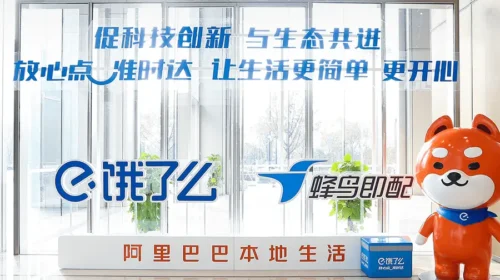Alibaba’s breakup in tatters, could 2025 be the year of asset shedding?

Nearly two years after the company announced a major breakup into its six major business units, most of that plan has been undone by CEO Eddie Wu and Chairman Joe Tsai
Key Takeaways:
- Alibaba is selling Intime, a traditional department store chain it acquired as part of a “new retail” strategy that it’s now abandoning to focus on its core e-commerce
- The company has scrapped most of its landmark plan to break itself up into its six major business units since the departure of CEO Daniel Zhang last year
By Doug Young
Its name derives from the tale of a poor woodcutter in ancient Persia who finds riches in a hidden cave. Alibaba Group Holding Ltd. (BABA.US; 9988.HK) seemed to follow that basic storyline for most of its life, rising from obscurity to become China’s leading e-commerce company as Chinese consumers embraced online buying.
But the last two years have been difficult ones for the company, which has become caught up in what looks like a period of indecision on how to regain its former glory. The changes taking place inside the company were in focus once more this week, when Alibaba announced it was selling the Intime department store chain it acquired in stages starting in 2017.
According to the announcement, Alibaba will sell the chain to men’s apparel maker Youngor Group, as well as Intime’s management. Alibaba said it will receive gross proceeds of 7.4 billion yuan ($1 billion) from the sale and record an even larger loss of 9.3 billion yuan.
The sale doesn’t come as a huge surprise, since Alibaba Chairman Joe Tsai said in February that this type of brick-and-mortar retail operation was not part of Alibaba’s core focus anymore, and it would make sense to exit such businesses. Similarly, Alibaba is also in talks to sell its majority stake in Sun Art (6808.HK), owner of the RT-Mart supermarket chain, Sun Art disclosed in October.
Alibaba purchased both Intime and Sun Art in a different era when founder Jack Ma was still at the helm of the company. The purchases were part of Ma’s “new retail” strategy at that time combining its core e-commerce strength with traditional brick-and-mortar retailing. They were part of an even larger acquisition binge by Alibaba that included takeout dining pioneer Ele.me, early video streaming leader Youku, and numerous other assets covering everything from traditional media to social media and mapping services.
None of those acquisitions outside its core e-commerce seemed to thrive too much under Alibaba ownership. That fact, combined with government concerns that the company was becoming too big and powerful, led Alibaba to announce a plan to break itself up into six main business units in March 2023 – a move the company said would “unlock shareholder value and foster market competitiveness.”
The six units included the company’s core domestic e-commerce business; its international e-commerce assets; its local services that included Ele.me; its Cainiao logistics arm; and its digital media and entertainment, which includes Youku.
Investors initially greeted the breakup news with enthusiasm but have gradually grown exasperated over the company since then as it largely dismantled the plan one piece at a time. Behind that dismantling was the surprise departure of Daniel Zhang, first as the company’s CEO and then as CEO of its cloud division last year. Alibaba co-founder Eddie Wu has stepped in as CEO since then, with another co-founder, Joe Tsai, becoming more active at the company in his role as chairman.
Breakup interrupted
Wu and Tsai appear to have jointly interrupted the company’s original breakup plan that was presumably engineered by Daniel Zhang, perhaps with encouragement from Jack Ma, who has largely stayed out of view since stepping down as Alibaba chairman in 2019.
Alibaba announced Zhang’s departure as CEO in June 2023 to focus on his new role as chief of Alibaba’s cloud unit, considered one of the company’s crown jewels outside its e-commerce business. But the first signs that the breakup plan was unraveling came just three months later when the company announced Zhang’s surprise departure from the cloud unit.
Two months after that, in November last year, Alibaba abruptly canceled the spinoff of the cloud unit, saying the business was taking a hit from U.S. actions to choke off China’s supply of advanced microchips. In hindsight, the spinoff’s cancellation looks like it could have also come as Tsai and Wu began to re-evaluate the original breakup plan.
Around the same time the cloud spinoff was being scotched, reports also emerged that Alibaba was putting plans for an IPO by its Freshippo supermarket unit on hold. That unit wasn’t one of the six from the original breakup plan, but its spinoff was part of the bigger plan to make some of Alibaba’s other major businesses operate independently.
The unraveling continued in March this year, when Alibaba said Cainiao would no longer be spun off either. Tsai explained in a blog post the unit was of too much “strategic importance” to the company and held “significant long-term opportunity” for Alibaba to build out a global logistics network.
The latest unraveling of the breakup plan came just last month when Alibaba announced it would no longer spin off its international e-commerce division, known as Alibaba International. Instead, it said, the international unit would be merged with Alibaba’s domestic e-commerce division centered on its two core marketplaces, Tmall and Taobao.
That leaves digital media and entertainment, and local services, as the only two remaining of the original six business units whose spinoff plans haven’t been altered or canceled yet. But we wouldn’t be surprised to see some adjustments for those two divisions as well next year, and, truth be told, neither of those divisions is very big anyhow.
Alibaba’s stock hasn’t done much during the recent rally for U.S.- and Hong Kong-listed Chinese shares. Its U.S.-listed stock is up about 8.8% this year, or about half the 15% increase for the iShares MSCI China ETF. Its forward price-to-earnings (P/E) ratio is also just 8.8, which is a fraction of the 35 for Amazon (AMZN.US), though is still ahead of domestic rivals JD.com (JD.US; 9618.HK) at 8.6 and PDD Holdings at 7.8.
It’s a bit difficult to say what Joe Tsai and Eddie Wu are trying to do at this point, other than to undo Daniel Zhang’s previous breakup plan. The latest Intime and Sun Art sales show this pair don’t believe brick-and-mortar retailing has much of a future at Alibaba. The latest cancelation of the international e-commerce spinoff also appears to show the company will focus on becoming a global e-commerce company in the future. We wouldn’t be surprised to see the company potentially sell many of its other assets outside e-commerce in the next year or two, with the exceptions of its cloud and Cainiao logistics businesses.
To subscribe to Bamboo Works free weekly newsletter, click here






